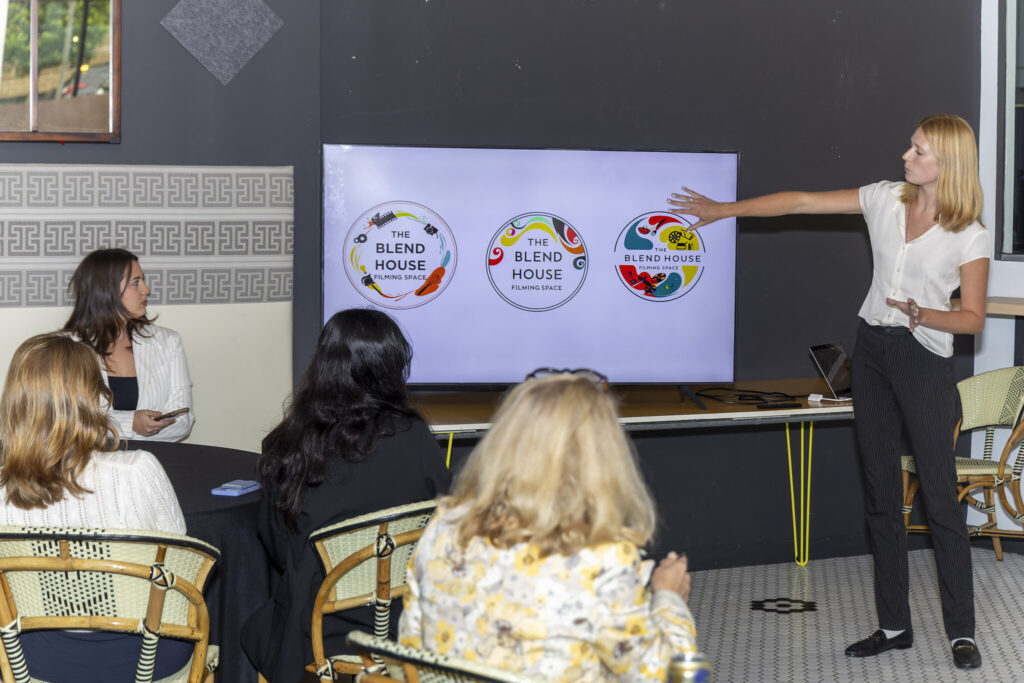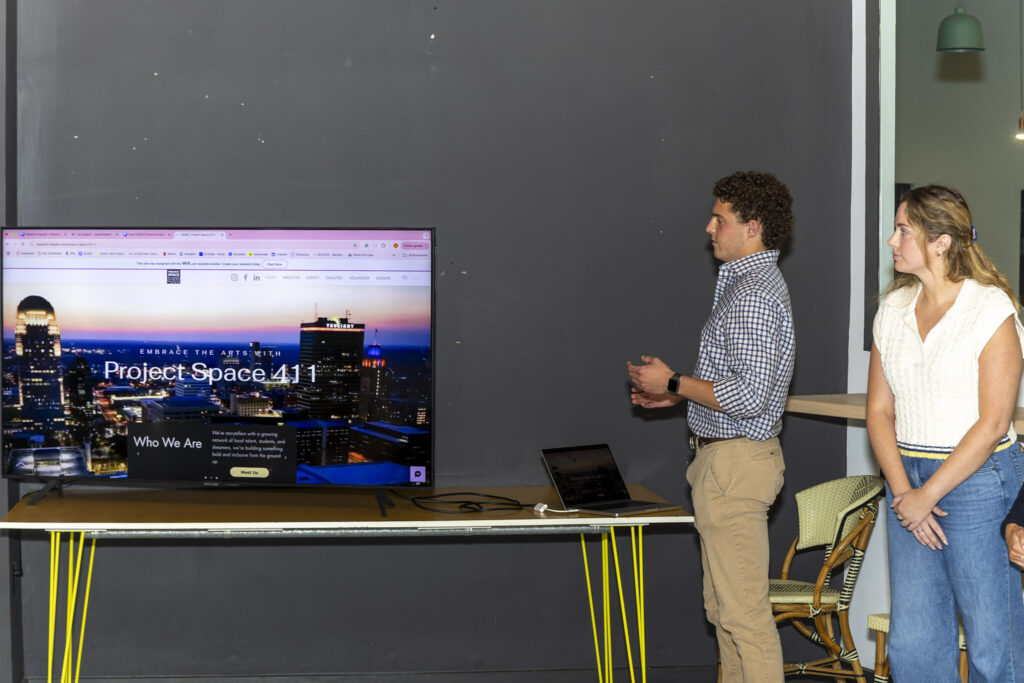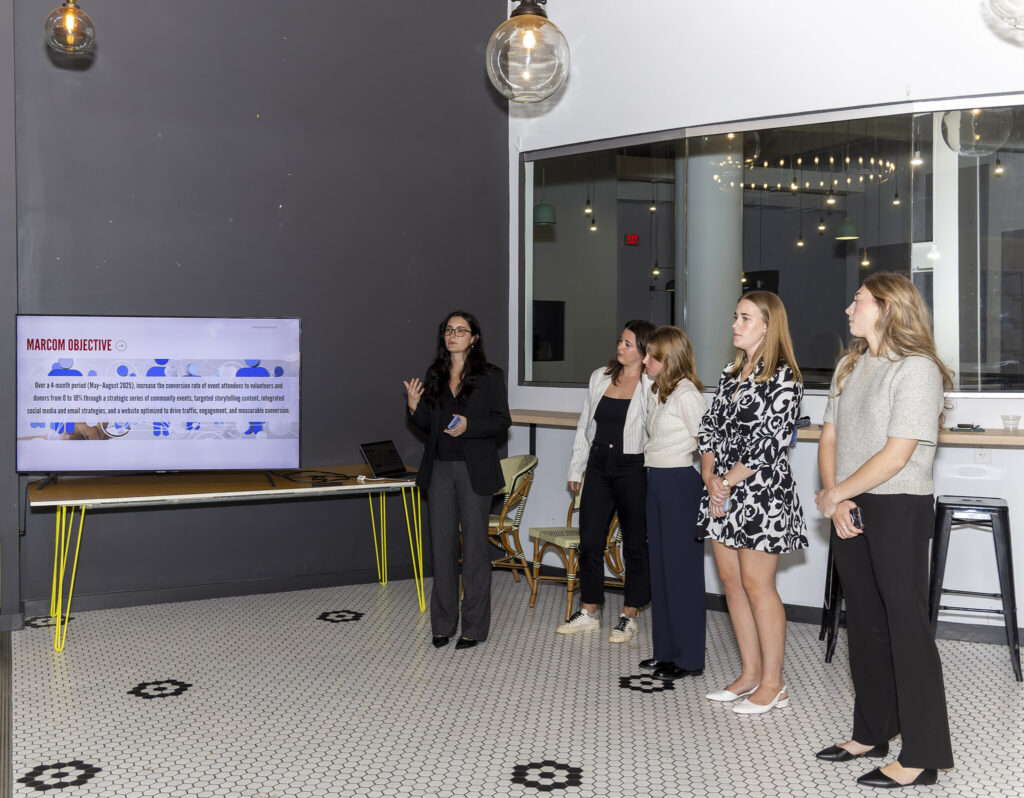Collaboration in Action: Wake Forest Students Help Shape the Vision for Winston-Salem’s Next Creative Hub
When the leadership of nonprofit Project Space 411, an inclusive space for creative collaborations of all kinds, first envisioned launching a film and media studio in downtown Winston-Salem, they had a bold idea and an abundance of passion. What they didn’t yet have was a name, a fully formed strategy, or the marketing resources to bring that idea to life. That changed when they partnered with students from Wake Forest University.
Through a semester-long collaboration with Professor Nanelle Napp’s “Integrated Marketing Communications for Nonprofits” course, students in Wake Forest’s Department of Communication helped shape the foundation for what will one day become The Blend House—a flexible-use, community-rooted media studio that, once funded and built, aims to support inclusive storytelling, spark job creation and training, and drive economic growth in the Triad region.

This partnership exemplifies Wake Forest’s broader commitment to meaningful university-community collaboration. It’s a reminder that when higher education opens its doors to the community—and the community invites students in—the results can be transformative on both sides.
A Vision for Inclusive Storytelling and Economic Growth
Still in the early stages of planning and fundraising, The Blend House is envisioned as a modular, flexible-use, state-of-the-art production space located at 411 W. 4th Street in the heart of downtown Winston-Salem. Serving both professional clients and community members, the space will be outfitted to accommodate film and TV shoots, podcasting, and other media formats that support creative expression and local impact. It will feature the only modular filming kitchen within a 200 mile radius, designed to support high-quality culinary arts and food preparation video content.
But the vision goes far beyond equipment and infrastructure.
The Blend House will be Winston-Salem’s first creative studio specifically designed to amplify underrepresented voices while driving economic and professional opportunity. Its mission is rooted in the belief that storytelling can foster community empowerment and help grow the region’s creative economy in equitable ways. The facility will give professionals across the Triad access to top-tier production capabilities while also generating revenue to fund free or low-cost storytelling projects for the broader community.
“This isn’t just about film—it’s about access,” said Project Space 411 board member Claire Calvin. “We want to give people the tools and space to share stories that matter. And we want this to be a place where community members—especially those who haven’t historically had access to production tools—can develop skills, build careers, and connect with others.”
Calvin and other board members worked directly with students throughout the semester, offering them insight into industry expectations and helping them understand the studio’s aspirations.

From Coursework to Community Contribution
The students approached the project as consultants, not just learners. Each team was responsible for delivering a core marketing component, such as a branding strategy, website concept, event plan, or social media plan and content, but the entire class engaged in deep research to inform their recommendations.
As part of their work, students conducted literature reviews and competitive analyses on a range of topics essential to the studio’s long-term success. They explored models of successful film and video production facilities across North Carolina and in cities like Charleston and Atlanta. They studied hybrid nonprofit models that blend commercial services with a charitable mission. They researched the structure and strategy of regional film festivals. And they dug into the science behind storytelling, examining how film can influence behavior change, drive policy reform, and serve as a powerful advocacy tool.
After weeks of research and design work, the students delivered polished, actionable plans that exceeded the board’s expectations.
“We expected a few good ideas,” said board advisor Mary Lynn Sullivan. “Instead, we walked away with a four-month, executable plan, a brand identity, and the confidence to move forward. They exceeded every expectation.”

The students’ work also helped board members clarify the potential of The Blend House, not just as a creative studio, but as a civic engine for equity, education, and economic development.
Once operational, The Blend House will support video storytelling across a wide range of urgent social topics, from nutrition and healthy eating to climate change, addiction recovery, and physical and mental wellness. It will also provide training and career pathways for local residents and expand video production access for schools and universities across the region.
In short, it’s not just a studio—it’s a catalyst for connection, access, and community change.
“We weren’t just helping them promote something,” said senior Holland Tyson, whose team focused on social media strategy. “We were helping them build something that could last—something that could make a real difference.”
A Model for University-Community Partnership
For Professor Napp, who designed the course, this kind of engagement is exactly what higher education should foster.
“I tell my students that doing good work is just as important as getting a good grade. This partnership was an opportunity to do both. They weren’t working on a theoretical case—they were helping to shape the future of a real nonprofit effort. It was exciting, high-stakes, and deeply meaningful.”
Professor Nanelle Napp
The collaboration also reshaped how Project Space 411 views partnerships with local universities.
“We’re completely sold,” said Sullivan. “I’m not sure why everyone doesn’t work with area students. They brought fresh perspectives, incredible professionalism, and ideas we never would have developed on our own.”
And for Calvin, the experience was a reminder of the value emerging professionals can bring to complex creative initiatives.
“They showed up like professionals,” Calvin said. “Their work was creative, strategic, and grounded in real-world thinking. What they delivered would stand up in any agency pitch room.”
The Path Ahead
While The Blend House remains in the conceptual stage, Wake Forest students have given Project Space 411 the tools to move forward with clarity and purpose. The plans developed during the course—ranging from messaging frameworks and launch event ideas to detailed content calendars and brand assets—are already being used in board meetings, community conversations, and outreach to potential donors and sponsors.
Once fully realized, The Blend House will become a resource for both professionals and community members across the Triad. It will offer top-quality facilities for culinary and media production, create job training and career opportunities, and make the power of video storytelling accessible for local nonprofits, schools, and underrepresented voices.
For the students who helped shape it, the experience has already left a mark.
“Our ideas helped bring clarity to a vision,” said senior Liz Pezeu. “And knowing that something we created might one day become part of a vibrant creative space in Winston-Salem—that’s incredibly fulfilling.”
Tyson agreed. “We’re leaving something behind that we can be proud of. That’s the kind of impact you hope to have as a student—not just on campus, but in the world around you.”
For Professor Napp, the course reflects the positive culture that higher education can affect.
“This is what experiential learning is all about,” she said. “It’s not just about students gaining knowledge—it’s about using that knowledge in service of something greater. When the classroom meets the community, everyone benefits.”
For questions related to The Blend House, email info@projectspace411.org. For information about potential nonprofit collaborations with future classes, email Nanelle Napp.
